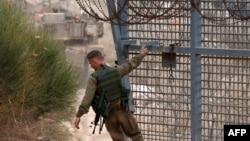Israeli troops this week took over a buffer zone between Israel and Syria in the wake of the Syrian government’s fall, and Prime Minister Benjamin Netanyahu says they will remain for now.
After a meeting with Biden administration national security advisor Jake Sullivan in Jerusalem, Netanyahu’s office said that Israeli troops will stay in the buffer zone next to the Golan Heights until some force on the Syrian side can ensure security for Israelis.
The United Nations, France and other countries have accused Israel of violating the 1974 disengagement agreement between the Mideast neighbors, but Israeli officials say the move is temporary.
Israeli officials say they fear that the ouster of Syrian President Bashar al-Assad created a vacuum as Syrian troops in the buffer zone fled. Netanyahu’s office said that Israel will not permit militant groups to fill that vacuum and threaten Israeli communities in the Golan Heights with October 7-style attacks.
The statement referred to the October 7, 2023, attack by Hamas from Gaza that killed some 1,200 Israelis and led to 250 being taken captive, 100 of whom, living and dead, are still being held.
Brigadier General (Reserve) Nitzan Nuriel, the former head of the Counter-Terrorism Bureau of the Israeli National Security Counci, said Israel is carefully watching events in Syria.
“The worst-case scenario for Syria is that Syria may become the Somalia of the Middle East, meaning many organizations fighting each other,” Nuriel said. “‘Stability’ will not be the nickname of Syria for the next few years.”
Israel also has launched hundreds of airstrikes on weapons stores and seized tanks and other weaponry. Military analysts say they believe Israel has destroyed almost all of Syria’s offensive capability.
“This is a pure preemptive attack to make sure that those unexpected rivals will not be able to use aircraft, artillery, chemical weapons and ... so on,” Nuriel said.
Former senior intelligence official Avi Melamed said Israel is watching as the rebel groups who overthrew Assad take control in Syria. He said that rebel leader Abu Mohammed al-Jolani seems to be taking power in Damascus.
The concern, Melamed said, is that Jolani leads the Hayat Tahrir al-Sham, a group the Biden administration has designated as a terrorist organization and says has links to al-Qaida.
"He is coming from al-Qaida,” Melamed said. “He was operating in Iraq and in Syria.”
But Melamed said that in recent years Jolani has broken away from al-Qaida and seems to have moderated his positions.










